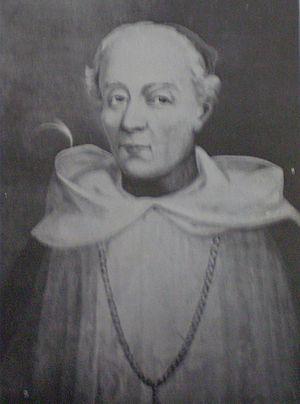Justo de Santa María de Oro facts for kids
Quick facts for kids
Justo de Santa María de Oro y Albarracín
|
|
|---|---|
 |
|
| Bishop of San Juan de Cuyo | |
| In office 1834 – 19 October 1836 |
|
| Succeeded by | José Manuel Quiroga Sarmiento |
| Personal details | |
| Born | 3 March 1772 San Juan, Viceroyalty of Peru |
| Died | 19 October 1836 (aged 64) San Juan, Argentina |
| Nationality | Argentine |
| Occupation | Priest |
Justo de Santa María de Oro y Albarracín (1772–1836) was an important Argentine leader. He was a statesman, meaning a wise political leader. He was also a bishop, a high-ranking church official. He played a big part in Argentina's history. He helped declare Argentina's independence on July 9, 1816.
Contents
Early Life and Education
Justo de Santa María de Oro was born in San Juan, Argentina. His parents were Juan Miguel de Oro and Elena de Albarracín. He began his studies at the Convent of Santo Domingo.
Later, he moved to Chile to continue his education. He studied at the Convent of Santo Domingo in Santiago. He earned a special degree, called a doctorate, from the Royal University of San Felipe. By the age of 20, he was already teaching theology, which is the study of religious faith. When he was 21, he became a priest.
Working for Independence
In 1814, Santa María de Oro crossed the Andes mountains. He traveled with many Chilean patriots, who were people fighting for their country's freedom. He met General José de San Martín, a famous South American hero. They became good friends and worked together. Santa María de Oro helped to create and prepare the Army of the Andes. This army was very important in fighting for independence.
In 1815, Santa María de Oro was chosen to represent San Juan. He became a member of the Congress of Tucumán. This was a very important meeting in 1816. At this meeting, Argentina officially declared its independence. Santa María de Oro strongly believed that Argentina should be a republic. A republic is a country where the people choose their leaders. He did not agree with those who wanted a king or queen. He thought the people should decide their own future.
Becoming a Bishop
After the declaration of independence, Santa María de Oro returned to San Juan. Then he went back to Chile. There, he was chosen to lead his religious order. In 1828, the Pope appointed him as an Apostolic Vicar in San Juan. This meant he was a special representative of the Pope.
Later, in 1830, he became the Bishop of Taumaco. In 1834, he became the first Bishop of the new Roman Catholic Archdiocese of San Juan de Cuyo. This was a very important position in the church.
Family Connection
Justo de Santa María de Oro was related to another important Argentine leader. He was a second cousin to Domingo Sarmiento. Domingo Sarmiento later became the President of Argentina, serving from 1868 to 1874.
See also
 In Spanish: Justo Santa María de Oro para niños
In Spanish: Justo Santa María de Oro para niños
 | Jackie Robinson |
 | Jack Johnson |
 | Althea Gibson |
 | Arthur Ashe |
 | Muhammad Ali |

